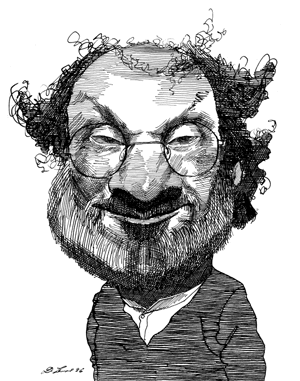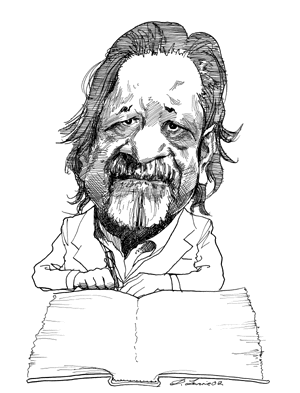One of the great mysteries of the writer’s life is the transformation that occurs when he or she passes from being an unpublished to a published novelist. If you are looking for a textbook case, check out the career of Salman Rushdie. Here he is interviewed in the Paris Review in 2005:
Many people in that very gifted generation I was a part of had found their ways as writers at a much younger age. It was as if they were zooming past me. Martin Amis, Ian McEwan, Julian Barnes, William Boyd, Kazuo Ishiguro, Timothy Mo, Angela Carter, Bruce Chatwin—to name only a few. It was an extraordinary moment in English literature, and I was the one left in the starting gate, not knowing which way to run. That didn’t make it any easier.
It’s a competition. Pick up a copy of Rushdie’s memoir Joseph Anton (the pseudonym that aligns Rushdie with two of the greatest writers of modern times) and you find that almost every relationship, whether it be with friends and rivals at school, with his wives and partners, with fellow writers, and finally with the world of Islam is seen in terms of winning and losing. And at the painful core of these struggles, at least early on, is “his repeated failures to be, or become, a decent publishable writer of fiction.” This is the competition of competitions. Publication. Eventually, Rushdie decides that this failure is tied up with an identity question and “slowly, from his ignominious place at the bottom of the literary barrel, he began to understand…”
He sets off to India to reinforce the Indian side of his identity because he perceives this will help him to become a successful writer, and indeed soon conceives “a gigantic, all or nothing project” in which “the risk of failure was far greater than the possibility of success.” After the publication of Midnight’s Children, “many things happened about which he had not even dared to dream, awards, bestsellerdom and on the whole, popularity.” Of the night when he was awarded the Booker he speaks of his pleasure in opening the “handsome, leatherbound presentation copy of Midnight’s Children” with “the bookplate inside that read WINNER.”
This is what it is about. One reads Rushdie’s novels and finds that the major characters, like their creator, tend to be locked into struggles about winning, losing, and general self-aggrandizement: Ormus Cama, for example, hero of The Ground Beneath Her Feet, is as desperate to become a rock star as Rushdie was to become a writer. He is also determined to win the beautiful and talented Vina, who despite affection for him sees acceptance of his offer of love as a form of capitulation, eager as she is to have a singing career at least as great as his. Meantime Rai Merchant, the narrator of the novel, competes with Ormus for Vina’s affections. Satanic Verses also fields two protagonists both seeking success and celebrity, with the more Rushdie-like of them winning the day.
But more than the plots, Rushdie’s constantly crackling language, full of puns and games, and the unrelenting erudition, rapidly establishes a hierarchy that has the writer/narrator dominant and the reader reduced to supine admiration, or if not, irritated. These are the only two responses. On many occasions in Joseph Anton, Rushdie expresses genuine puzzlement as to why he has so many enemies among reviewers and fellow authors. More than other winners, he feels. Perhaps it is because he makes it so clear just how important being seen to be a winner is.
On this, alas, he is right. No one is treated with more patronizing condescension than the unpublished author or, in general, the would-be artist. At best he is commiserated. At worst mocked. He has presumed to rise above others and failed. I still recall a conversation around my father’s deathbed when the visiting doctor asked him what his three children were doing. When he arrived at the last and said young Timothy was writing a novel and wanted to become a writer, the good lady, unaware that I was entering the room, told my father not to worry, I would soon change my mind and find something sensible to do. Many years later, the same woman shook my hand with genuine respect and congratulated me on my career. She had not read my books.
Why do we have this uncritical reverence for the published writer? Why does the simple fact of publication suddenly make a person, hitherto almost derided, now a proper object of our admiration, a repository of special and important knowledge about the human condition? And more interestingly, what effect does this shift from derision to reverence have on the author and his work, and on literary fiction in general?
Advertisement
Every year, I teach creative writing to just a couple of students. These are people in their mid-twenties in a British post-graduate course who come to me in Italy as part of an exchange program. The prospect of publication, the urgent need, as they see it, to publish as soon as possible, colors everything they do. Often they will drop an interesting line of exploration, something they have been working on, because they feel compelled to produce something that looks more “publishable,” which is to say, commercial. It will be hard for those who have never suffered this obsession to appreciate how all-conditioning and all-consuming it can be. These ambitious young people set deadlines for themselves. When the deadlines aren’t met their self-esteem plummets; a growing bitterness with the crassness of modern culture and the mercenary nature, as they perceive it, of publishers and editors barely disguises a crushing sense of personal failure.
But we’re all aware of the woes of the wannabe. Less publicized is how the same mentality still feeds the world of fiction on the other side of the divide. For the day comes when wannabes, or at least a small percentage of them, are published. The letter, or phone call, or email arrives. In an instant life is changed. All at once you’re being listened to with attention, you’re on stage at literary festivals, you’re under the spotlight at evening readings, being invited to be wise and solemn, to condemn this and applaud that, to speak of your next novel as a project of considerable significance, or indeed to pontificate on the future of the novel in general, or the future of civilization.
Neophytes are rarely unhappy with this. I have often been astonished how rapidly and ruthlessly young novelists, or simply first novelists, will sever themselves from the community of frustrated aspirants. After years fearing oblivion, the published novelist now feels that success was inevitable, that at a very deep level he always knew he was one of the elect (something I remember V.S. Naipaul telling me at great length and with enviable conviction). Within weeks messages will appear on the websites of newly minted authors discouraging aspiring authors from sending their manuscripts. They now live in a different dimension. Time is precious. Another book is required, because there is no point in establishing a reputation if it is not fed and exploited. Sure of their calling now, they buckle down to it. All too soon they will become exactly what the public wants them to be: persons apart, producers of that special thing, literature; artists.
It alters everything. The dynamic in his marriage shifts. Or her marriage. An unpublished wife is one thing and a published wife quite another. The relationship with the children is conditioned by it. A new circle of friends is acquired. Yet as over time the author explores and grows into the position society so readily and generously acknowledges to the artist, embracing or rejecting the opportunity to play the moralist, or alternatively the rebel—but the two so often coincide—to be constantly visible, or to retreat into a provocative invisibility, there nevertheless remains one thing he or she must never do. He must never acknowledge, or if he does so only ironically, as if really this were a joke, the fierce ambition that is driving this writing, and beneath that the presumption of an insuperable hierarchy between writer and reader, or simply writer and non-writer, such that the former is infinitely more important, and indeed somehow more real than the latter.
Let’s try to frame this more clearly. How many broad criteria are there for assessing or appraising another person? Not that many. Crudely we can think of them as good or evil, courageous or cowardly, belonging to our peer group or not belonging, talented or untalented, winners or losers. Naturally each of these criteria has its nuances and subsets, but basically, I think, that is it. And if I were asked which is dominant today, I would have to say the last. What matters is winning, sales, celebrity, world domination. Yet this must never be acknowledged as the principal value. So one wins apparently championing other virtues and talking about quite other matters. In Joseph Anton Rushdie understandably raises the banner of freedom of speech—How is it fair, he asks at one point, that Margaret Thatcher is free to arrange a book presentation when I, because of the security costs, am not? This is not necessarily hypocrisy. One can care a great deal about this or that issue, or art form, or aesthetic, while beneath what still matters most is winning.
You can get interesting insights into this opening up author websites, especially the less celebrated authors who maintain their sites themselves. Almost the first thing in front of you is a prize, an indication of success. “Born in Dublin in 1969, I am an award-winning writer…” is the opening announcement from Emma Donoghue, author of the highly successful Room. Arnon Grunberg, arguably Holland’s most successful living novelist, has a map of the world on which only those countries who have published his work are named. But they are many. Click on Egypt, Estonia, Japan and you can see what was published there. Grunberg blogs in English and is clearly eager to have a world audience. So am I, for that matter. What is success without a world audience these days?
Advertisement
The question remains, why do people have such a high regard for authors, even when they don’t read? Why do they flock to literary festivals, while sales of books fall? Perhaps it is simply because reverence and admiration are attractive emotions; we love to feel them, but in an agnostic world of ruthless individualism it gets harder and harder to find people you can bow down to without feeling a little silly. Politicians and military men no longer fit the bill. Sportsmen are just too lightweight, their careers so short-lived. In this sense it is a relief for the reader and even the non-reader to have a literary hero, at once talented and noble, perhaps even longsuffering, somebody who doesn’t seem chiefly concerned with being more successful than us. Alice Munro, with her endless, quietly sad accounts of people who fail to achieve their goals, gets it just right here. Exploring that sense of failure so many feel in a competitive world, she wins the biggest prize of all.




